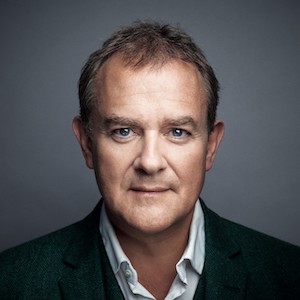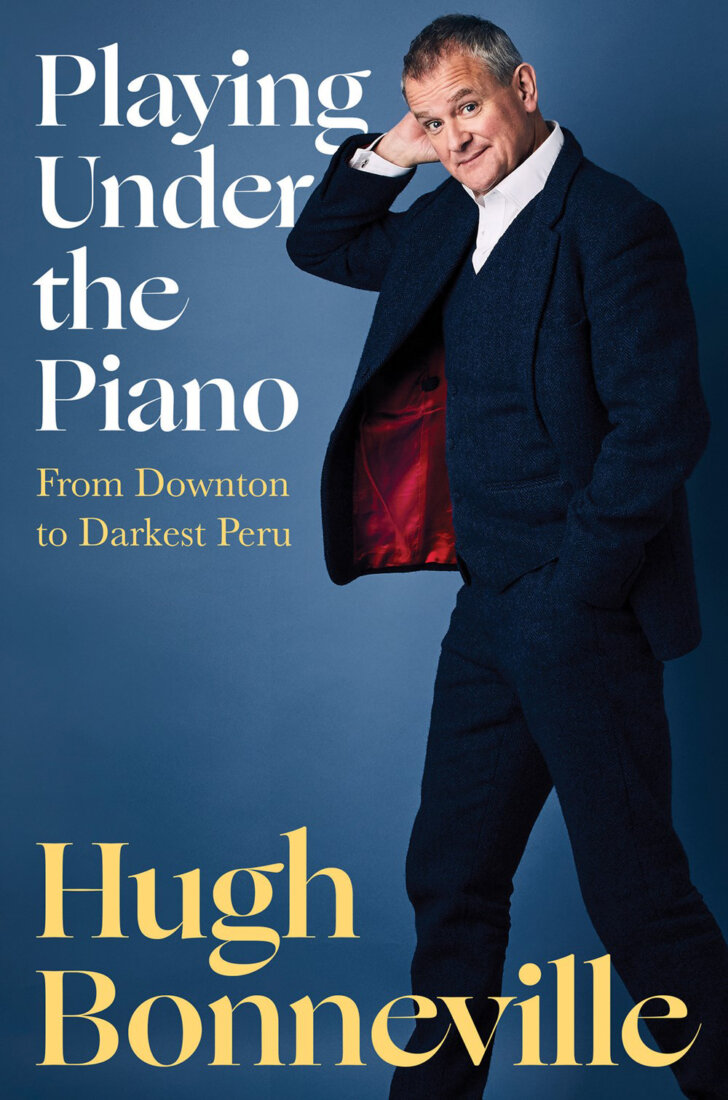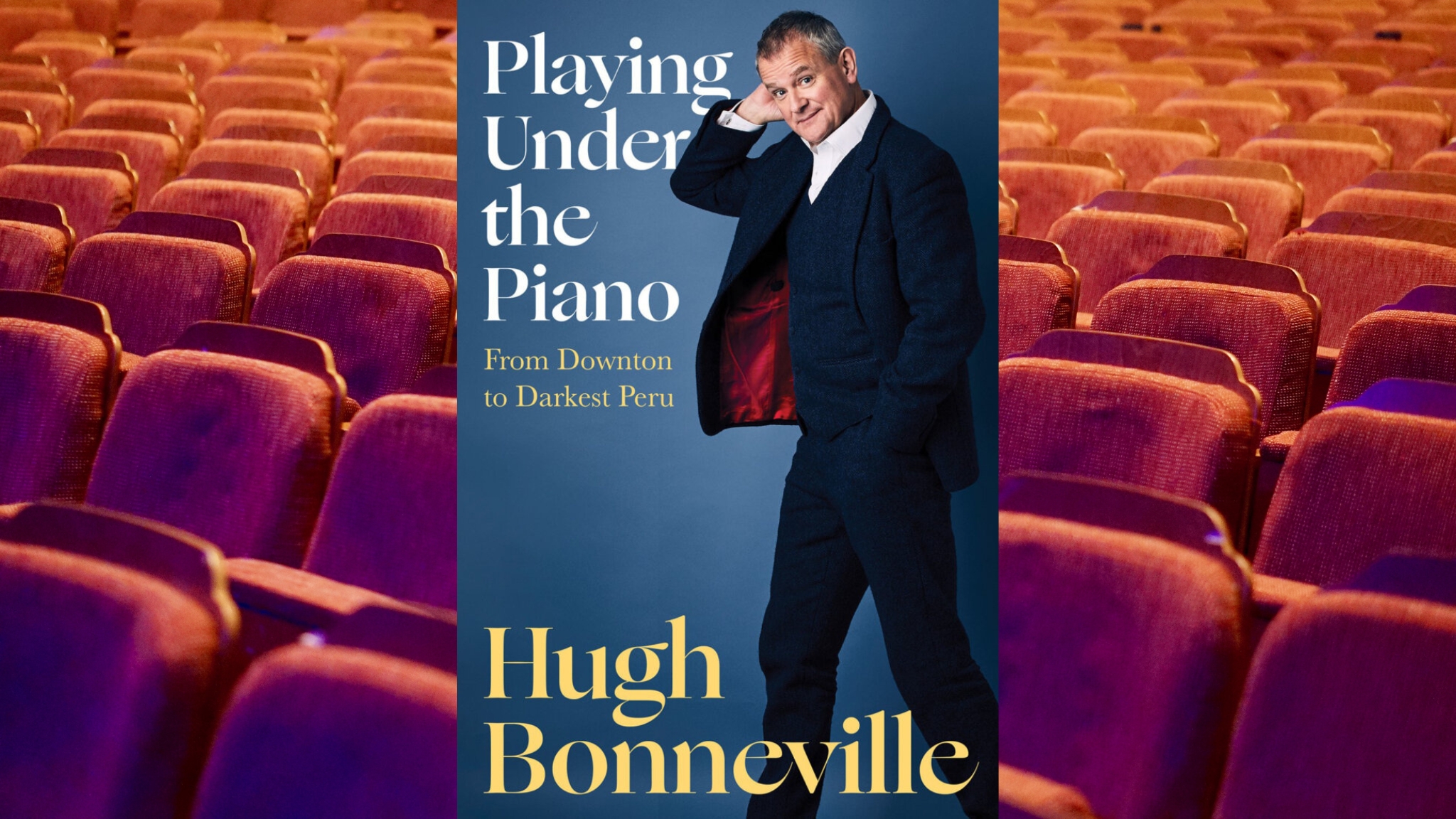Playing Under the Piano: From Downton to Darkest Peru by Hugh Bonneville
What's It About?
This laugh-out-loud memoir follows the life and career of Hugh Bonneville, a beloved British actor famous for his roles in Downton Abbey and Paddington.Hugh Bonneville is a talented, skilled, versatile, well-established, working actor, neither a diva nor a flavor of the month celebrity whose memoir Playing Under the Piano: From Downton to Darkest Peru (Other Press) is perfectly smashing!
It has a ready-made audience with Downton Abbey aficionados who already admire his character — the patriarch and family man Robert Crawley, Earl of Grantham — and will surely be as impressed with the actor who ably embodies him. His self-deprecating humor, fine writing and hilarious anecdotes about his long career should attract new admirers.
Bonneville’s Art-Filled Youth
Hugh Richard Bonneville Williams was born on November 10, 1963 in the Paddington District (Westminster), London which seems serendipitous given his later role as Mr. Henry Brown in the live-action films, Paddington (2014) and Paddington 2 (2017) and as the narrator for the recent audiobooks of the small golden bear from “Darkest Peru”. He garnered accolades for his work from the late Paddington bear creator Michael Bond and his daughter who controls the estate.
This hard-working actor was the baby in the Williams family; eight years younger than his brother Nigel and six years younger than his sister Clare. Their father was a respected Harley Street urological surgeon and accomplished amateur pianist who favored the classics with a particular fondness for Schubert.
Their mother was a nurse before marriage and children, who returned to part-time work three days per week when Hugh was in primary school. She told him she was a file clerk in an office downtown. The truth became apparent to the entire family when at least five senior Secret Service officers attended her funeral; she had, in fact, top security clearance and served in a much higher capacity for MI6 (Foreign Intelligence Service).
The family, though not wealthy, was comfortably upper middle class with the cultural advantages of parents who routinely attended and brought their children along to museums, music programs, operas, lectures and the theater and enjoyed entertaining guests at home. Some of the activities bored young Hugh but the theater always beckoned beginning with his nursery school participation in nativity plays.
The children grew up in a calm, well-ordered, harmonious household and their parents were approving of their educational and career choices. All three children eventually attended boarding school. Hugh’s acceptance into the National Youth Theatre in his mid-teens was a life-changing, career-determining experience without which he may have become a barrister.
He earned a BA in Theology from Cambridge University while performing in numerous plays during his three years there followed by the Webber Douglas Academy of Dramatic Arts in London.
A Shakespearean Start to a Grand Career
His professional career began humbly in 1986 with a minor role in A Midsummer Night’s Dream, the first program of a three-play contract with Regent’s Park Open Air Theatre that included a prized provisional equity card. Hugh Bonneville has perseverance, tenacity and determination along with congeniality, talent, training and a dash of luck to thank for his success.
Prior to acceptance by Regent’s Park Repertory Company while still in drama school, he sent 160 letters to companies throughout the United Kingdom seeking work and received 159 rejections.
His television debut was in 1990 with two episodes in Chancer, a short-lived series. Tomorrow Never Dies, a James Bond film starring Pierce Brosnan brought his first movie role in 1997. Coincidentally, Julian Fellowes also acted in this film. They worked together again in From Time to Time, directed by Mr. Fellowes who spoke of some projects he was writing.
Ten months later, Hugh Bonneville was sent the pilot script for Downton Abbey. The sparkling dialogue and Robert Crawley’s character appealed to him. His agent advised against it as the ITV production required a three year contract and period dramas were decidedly out of fashion in 2009.
Upstairs Downstairs, a 1971 hit that ran five seasons and spawned a spinoff series fell flat after being re-launched by BBC and was canceled after nine episodes. To date, Downton Abbey has produced 52 episodes in six seasons, as well as two feature films making household names out of several previously unknown actors within its great ensemble cast.
It is a minor irritation to Hugh Bonneville to be questioned about his “overnight success” in this glorious series. By 2010, he had been a self-supporting, steadily working professional actor in theater, radio, television and films for 24 years when the first episode of Downton Abbey debuted.
Since that time, he has become a Red Carpet regular at premieres and on talk shows whose work continues, expanding to include numerous book narrations and serving as a Host/Narrator for some of the prestigious BBC PROMS.
Humor, Passion and Entertaining Anecdotes
The thoroughly entertaining memoir Playing Under the Piano: From Downton to Darkest Peru is a strong indicator that Hugh Bonneville could enrapture an audience with his keen sense of humor should he suddenly take up stand-up comedy.
Downton Abbey is by no means his sole legacy but the recognition from playing Robert Crawley has substantially enhanced his popularity with international audiences and ensured his ability to secure restaurant reservations. I confess to being as mad about the show as this exceptional memoir. (Dressing Downton: Changing Fashion for Changing Times was a swoon-worthy exhibition in 2017 at the Cheekwood Estate in Nashville).
I highly recommend Playing Under the Piano. It brightened my bedtime reading as I disturbed my husband’s more serious reading for a few evenings by frequently laughing out loud followed by gleefully sharing some of the anecdotes. It’s been a long time since I have read a memoir or autobiography that was as delightfully charming, interesting and well-written.
Hugh Bonneville has lived a life free of scandal without stints in rehab or multiple marriages which is not to say it has been dull or disinteresting. Readers can appreciate his obvious love for his family and his poignant remembrances of the loss of his always supportive parents and older brother.
He is living proof that reliable, steady, hard-working people can finish first and lead successful, happy lives and while amassing a treasure trove of experiences to share in a compelling memoir. This fine actor and now writer continues to entertain his ever-growing audience. Playing Under the Piano would be an excellent selection for book discussion groups.
More on the History of Repertory Theater
Repertory Theater in the United Kingdom, now almost moribund, rose to prominence early in the 1900’s when regional theaters became home to residence companies that performed a series of plays in quick rotation.
Unlike today, when individual shows are cast, the entire stock company would be hired for a season or more and would partake in most if not all productions. It would not be uncommon for the actors to perform in many different plays in rapid succession with, perhaps, Shakespeare one evening, followed by Shaw the next, then a French farce and so on.
Hugh Bonneville describes being awestruck by the behind-the-scenes quips and bantering that took place between the theatrical greats Michael Gambon and Anthony Hopkins who were the leads in four disparate productions in rotation on consecutive nights each week.
Salaries were low but they provided a steady and livable wage; board and lodging being sometimes dodgy, new actors would rely on experienced veterans for recommendations. It was not unknown for boarding houses to post signs like “No dogs and no actors allowed.”
However, this was a solid training ground for young, unseasoned actors fresh from drama schools or universities to learn the craft from the inside out from the established stars and their peers. Scouts for larger theaters in major cities and agents would periodically attend performances “in the provinces” creating career advancement opportunities.
The actors not only took on a large range of roles as well as serving as understudies but also learned firsthand the essential work of crew members. To succeed, one had to be on time, reliable, know their lines, be able to help a fellow cast member if they choked, not trip over furniture, and cooperate and get along with a wide variety of sometimes eccentric personalities.
The emphasis in Repertory Theatre is about the ensemble rather than the individual, although each had its stars. The continuity of having a well-trained company in residence was a major asset to these theaters as was the ability to store complete sets and costumes to quickly remount a show. It could also be a stepping-stone to film and television roles although television in its early days was frowned upon.
Many of the best-known actors in the UK got their start in repertory companies including Laurence Olivier, the Redgrave Family, Michael Caine, Sean Connery, Alan Rickman, Derek Jacobi, Ian McKellen, Judi Dench, Maggie Smith and countless others. The rise of television, diminished audiences, and the enormous financial burden of maintaining a large company brought about a steep decline in residential companies but a handful remain continuing the tradition of polishing green actors and crews and, most importantly, entertaining live audiences.
 About Hugh Bonneville
About Hugh Bonneville
Hugh Bonneville was a member of the National Youth Theatre of Great Britain and made his professional acting debut at the Open Air Theatre, Regent’s Park, in 1986. He joined the Royal National Theatre in 1987 and the Royal Shakespeare Company in 1991, where his roles included Laertes, opposite Kenneth Branagh’s Hamlet. He is perhaps best known for playing Mr Brown in the Paddington movies and Robert Crawley in the ITV/PBS series Downton Abbey. Over its six seasons and two movies, Downton Abbey won dozens of awards worldwide, Bonneville receiving a Golden Globe nomination and two Emmy nominations for his performance. He lives in West Sussex, England, with his wife, Lulu Williams, and their son, Felix.





